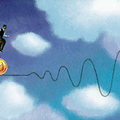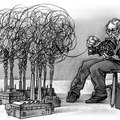Turmoil among Europe's corporate champions
| |
 | |
AT A time when Europe’s big companies can hold their heads up high, with results comparable to those of America’s corporate giants, comes a crop of boardroom upheavals and struggles for control—a surprising occurrence in the midst of a boom, and one that could mean tougher times ahead.
Wednesday May 23rd saw the unveiling of plans by Christian Streiff, the boss of PSA Peugeot Citroën, to redress falling profits. He moved to the car company after three disastrous months last year trying to run Airbus. At Peugeot he has called for nearly 5,000 jobs to be cut in France, but would avoid compulsory redundancies. Mr Streiff told shareholders that he would slash overheads by 30% and revive the company’s product range by launching 41 models by the end of 2010. Peugeot must contend with a car market where all the growth is far beyond Europe’s shores.
The new boss of Siemens, Europe’s leading engineering group and a bastion of German capital-goods manufacturing, comes with an appropriate name that translates as “fire extinguisher”. Peter Löscher, appointed on Sunday, has got a blaze to deal with at a firm engulfed by multiple bribery investigations and the departure of both its chairman and chief executive. He could be the blast of cold water that Siemens needs, but he faces the difficult task of mastering the giant conglomerate.
It is not just Peugeot and Siemens. Other prominent European companies in turmoil include EADS (the parent of Airbus), Daimler and Renault. The travails of Europe’s banks and energy firms largely stem from the belated introduction of a single market, while in other industries, such as telecoms and aviation, long-awaited consolidation is stirring things up. What is worrying about Siemens, EADS and others is that their woes may have a deeper cause: being wrongfooted by global competition.
Pessimists worry that the turmoil among Europe’s finest could herald the end of their success in the past ten years. Optimists hope that it will prompt a round of creative destruction that will enable European companies to raise their game and do better. The fate of these giants is particularly important because of the structure of the European economy.
Europe’s productivity is nearly one-third lower than America’s, according to a new study in the McKinsey Quarterly, because Europeans have chosen to work less than Americans. This sluggish productivity stifles the emergence of strong new firms and makes Europe heavily dependent on its existing corporate champions, which operate far beyond Europe. Their global scope means they can adapt to labour conditions at home—such as France’s 35-hour working week, or restrictions on their ability to sack redundant or unproductive workers—by eking out higher productivity elsewhere. Since Europe particularly relies on its corporate giants for its vigour, signs of turmoil in their ranks are worrying.
Yet might a shake-up be exactly what the giants need? The arrival at Siemens of Mr Löscher, a fresh-faced outsider, has led to renewed suggestions that the sprawling conglomerate ought to be broken up. Germany’s Daimler, as it will be known upon completing its sale of Chrysler, its American arm, is also in disarray. Daimler bought Chrysler to spread car-development costs over a wider revenue base. Its admission of defeat could be seen as a mature decision, as the company cuts its losses. But it leaves Daimler with no obvious strategy and it may even look like a target, given its unusual make-up: the world’s leading luxury-car brand, the world’s biggest truckmaker and a big shareholding in one of Europe’s most troubled groups, EADS.
The first thing Nicolas Sarkozy did as France’s new president was fly to Berlin to talk to Angela Merkel, inter alia, about the crisis at EADS. The next day he was in Toulouse, reassuring Airbus workers that the French state would help when Airbus wanted more capital, but also expressing his desire to see the government eventually replaced on the shareholders’ register by industrial and financial stakeholders. But this confusing pragmatism suggests little more than a wish to end the clumsy Franco-German stalemate over the future development of EADS and Airbus.
In the good years, European giants could have been forgiven for thinking that, having put themselves right, they could thrive by just getting on with the job. The uncomfortable truth now dawning is that today, as business globalises, large firms have to put themselves right time and again.




